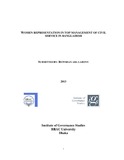| dc.contributor | Islam, Zohurul | |
| dc.contributor.advisor | Aminuzzaman, Salahuddin M. | |
| dc.contributor.author | Labony, Rowshan Ara | |
| dc.date.accessioned | 2014-08-28T08:28:01Z | |
| dc.date.available | 2014-08-28T08:28:01Z | |
| dc.date.copyright | 2013 | |
| dc.date.issued | 2013 | |
| dc.identifier.other | ID 12172001 | |
| dc.identifier.uri | http://hdl.handle.net/10361/3492 | |
| dc.description | This thesis is submitted in partial fulfillment of the requirements for the degree of Masters of Arts in Governance and Development, 2013. | en_US |
| dc.description | Cataloged from PDF version of thesis. | |
| dc.description | Includes bibliographical references (page 46 - 52). | |
| dc.description.abstract | Over the years women have managed to increase their number in the service of the Republic but their position in terms of power and influencing decision making has not yet improved; very often they are excluded from formal and informal decision making process and challenging duties. Since Bangladesh along with other developing nations are committed to reduction of gender discrimination as part of their social development programs; the state of inequality of women in the service of the republic calls for investigation of their actual status, find out the underlying reasons. In Bangladesh women have been regularly appearing in the service but the number of women in 28 cadres is still negligible. Women cannot exceed, nor can get closer to men in question of occupying positions that matters in terms of decision making. In particular, the presence of women in the top management of administration and policy formulation is not adequate that can affect economic and social development. The number of women in the top position of civil service is not a desirable reflection of ideal gender balancing. In fact, this situation of women is not an isolated case; it portrays a global picture of women’s status in the work environment. In our country it is often seen that women in the higher position were posted in the less challenging areas of jobs. Patriarchal values and stereotype attitudes are responsible for undermining women’s capability as a whole. Therefore, prime issues and problems of women remain unaddressed in decision making level because of lower representation of women in top management. Therefore, balancing women’s representation a comprehensive approach is needed by all in the organization that enhance the effectiveness of each other and development of the capacities of less confident ones. Most importantly, a significant increase of women in senior managerial positions requires a basic restructuring of the distribution of patriarchal power in the society. | |
| dc.description.statementofresponsibility | Rowshan Ara Labony | |
| dc.format.extent | 63 pages | |
| dc.language.iso | en | en_US |
| dc.publisher | BRAC University | en_US |
| dc.rights | BRAC University thesis reports are protected by copyright. They may be viewed from this source for any purpose, but reproduction or distribution in any format is prohibited without written permission. | |
| dc.subject | Governance and development | en_US |
| dc.subject | Civil service | en_US |
| dc.subject | Women representation | en_US |
| dc.subject | Civil servant | en_US |
| dc.title | Women representation in top management of civil service in Bangladesh | en_US |
| dc.type | Thesis | en_US |
| dc.contributor.department | Institute of Governance Studies, BRAC University | |
| dc.description.degree | M. Governance and Development | |

